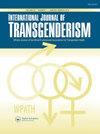Internalized transphobia: Exploring perceptions of social messages in transgender and gender-nonconforming adults
Q1 Social Sciences
引用次数: 56
Abstract
ABSTRACT Background: Transgender and gender nonconforming (TGNC) individuals encounter a variety of minority stressors that have yet to be fully articulated or explored within the research literature. The purpose of this study is to better understand internalized stigma—the experience of accepting and internalizing negative social messages and experiences about one's identity—an underexplored minority stressor for TGNC people. Method: We conducted in-depth interviews with 30 diverse TGNC participants using consensual qualitative research (CQR) methodology. Results: Following data saturation and analysis, six distinct themes emerged across participants: (1) TGNC identities are regarded negatively by society; (2) social messages are perceived as originating from the media and religious ideology; (3) TGNC individuals report emotional distress; (4) negative self-perceptions in response to social messages; (5) TGNC individuals report resilience processes in response to negative social messages; and (6) social messages are perceived generally to differentially impact TGNC people of color. Conclusion: Findings highlight the common experience of encountering social marginalization for TGNC individuals. Structural interventions that target pervasive sociocultural messages regarding TGNC identities are warranted.内化的跨性别恐惧症:探索跨性别和性别不一致的成年人对社会信息的感知
背景:跨性别和性别不一致(TGNC)个体会遇到各种各样的少数民族压力源,这些压力源在研究文献中尚未得到充分的阐述或探讨。本研究的目的是为了更好地理解内化耻辱——接受和内化负面社会信息和个人身份的经历——一个未被探索的TGNC少数民族压力源。方法:采用协商一致的定性研究(CQR)方法对30名不同的TGNC参与者进行了深入访谈。结果:在数据饱和和分析之后,参与者发现了六个明显的主题:(1)TGNC身份被社会视为负面的;(2)社会信息被认为来源于媒体和宗教意识形态;(3) TGNC个体存在情绪困扰;(4)对社会信息的消极自我认知;(5) TGNC个体对负面社会信息的回复过程;(6)社会信息对有色人种TGNC人群的影响普遍存在差异。结论:研究结果突出了TGNC个体遭遇社会边缘化的共同经历。针对普遍存在的关于TGNC身份的社会文化信息的结构性干预是必要的。
本文章由计算机程序翻译,如有差异,请以英文原文为准。
求助全文
约1分钟内获得全文
求助全文
来源期刊

International Journal of Transgenderism
Social Sciences-Gender Studies
CiteScore
5.10
自引率
0.00%
发文量
0
期刊介绍:
International Journal of Transgenderism, together with its partner organization the World Professional Association for Transgender Health (WPATH), offers an international, multidisciplinary scholarly forum for publication in the field of transgender health in its broadest sense for academics, practitioners, policy makers, and the general population.
The journal welcomes contributions from a range of disciplines, such as:
Endocrinology
Surgery
Obstetrics and Gynaecology
Psychiatry
Psychology
Speech and language therapy
Sexual medicine
Sexology
Family therapy
Public health
Sociology
Counselling
Law
Medical ethics.
 求助内容:
求助内容: 应助结果提醒方式:
应助结果提醒方式:


